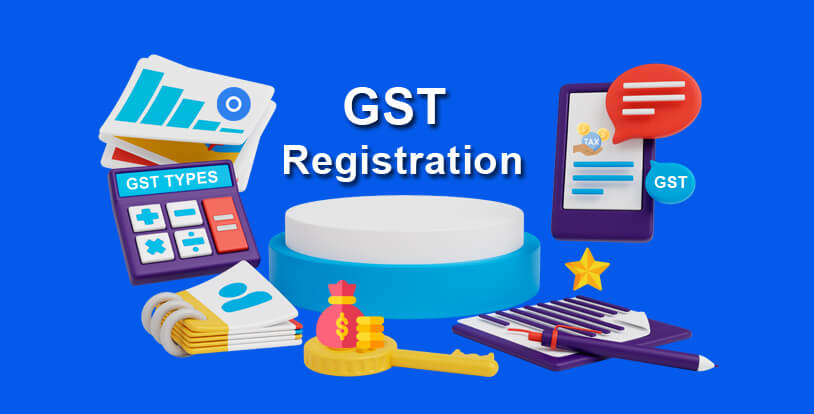
Please Wait transaction is in process, don't refresh page and do not press back button.
File your ITR Now and Claim Early Refund

GST Registration Types? Required Documents, Benefits
On July 1, 2017, Indian Government is implemented the Goods and Services Tax Act (GST). GST act was officially passed on March 29 the same year in the Parliament.
What is GST Registration?
GST stands for Goods and Services Tax. GST is an indirect tax that was created in India to eliminate many other indirect taxes, create a single taxation regime for ease of collection and increase the efficiency of the process.
GST registration is a process through which a taxpayer enrolls under GST. After successful registration, a unique registration number known as the Goods and Services Tax Identification Number (GSTIN) is allocated to the business.
This 15-digit number is assigned by the central government following the taxpayer's registration.
Types of GST Registration?
There are several types of GST registration. Here are the main types:
1. Regular GST Registration
3. Casual Taxable Person Registration
2. Composition Scheme Registration
4. Non-Resident Taxable Person Registration
5. Input Service Distributor (ISD) Registration
6. Tax Deducted at Source (TDS) and Tax Collected at Source (TCS) Registration:
7. UN Bodies / Embassies / Other Notified Persons Registration
8. E-commerce Operator Registration
1. Regular GST Registration : Applicable to businesses whose turnover exceeds the limit prescribed by the Government (GST Council) (limit is Rs 40 lakh for goods / Rs 20 lakh for services / special category states, limit is Rs 10 lakh for goods and services).
2. Composition Scheme Registration : Small businesses registered under the GST Composition Scheme can pay GST (Goods and Services Tax) at a fixed rate of turnover every quarter and file quarterly GST returns.
3. Casual Taxable Person Registration : Casual GST (Goods and Services Tax) registration in India is for those who engage in occasional taxable activities such as trade fairs or events, offering the flexibility to do so without full-time GST registration.
4. Non-Resident Taxable Person Registration : Non-resident taxable persons who are engaged in the supply of goods or services in India but do not have a fixed place of business in India are required to register under GST.
5. Tax Deducted at Source (TDS) and Tax Collected at Source (TCS) Registration: Persons who are required to deduct or collect tax at source under GST (Goods and Services Tax) are required to obtain registration for TDS or TCS.
6. Input Service Distributor (ISD) Registration : Businesses that have multiple branches or units that receive services centrally for common use by all units may register as an ISD. They distribute credit of GST paid on services to such units.
7. UN Bodies / Embassies / Other Notified Persons Registration : Under the GST regime, embassies, United Nations bodies and other notified persons are eligible for Unique Identification Number (UIN).
8. E-commerce Operator Registration : E-commerce operators are platforms that facilitate the sale of goods or services through electronic means. Under GST (Goods and Services Tax), e-commerce operators are required to obtain registration, irrespective of their turnover.
Documents required for GST Registration?
Applicant's Pan Card
Aadhar Card
Proof of business registration
Bank account statement
Address proof
Other documents (Utility bills, Authorization form)
Benefits of GST registration?
Legal Recognition : GST registration provides legal recognition to the business as a supplier of goods or services. It establishes the credibility and authenticity of the business in the eyes of customers, suppliers and regulatory authorities.
Consumer Confidence : GST registration increases consumer confidence as registered businesses are considered more trustworthy and reliable. Consumers are more likely to transact with registered businesses
Business Expansion : GST registration facilitates business expansion by enabling businesses to open multiple branches or units under a single registration.
E-commerce Platforms : Many e-commerce platforms require GST registration for sellers to list their products. Registering under GST helps businesses expand their market reach by selling through online platforms
Latest Post
House Rent Allowance (HRA) Exemption in ITR Online
11-February-2025
Tractor Insurance: Why It’s Essential for Your Tractor?
17-January-2025
Bike Insurance: How to file two wheeler insurance claim
15-January-2025
Tags